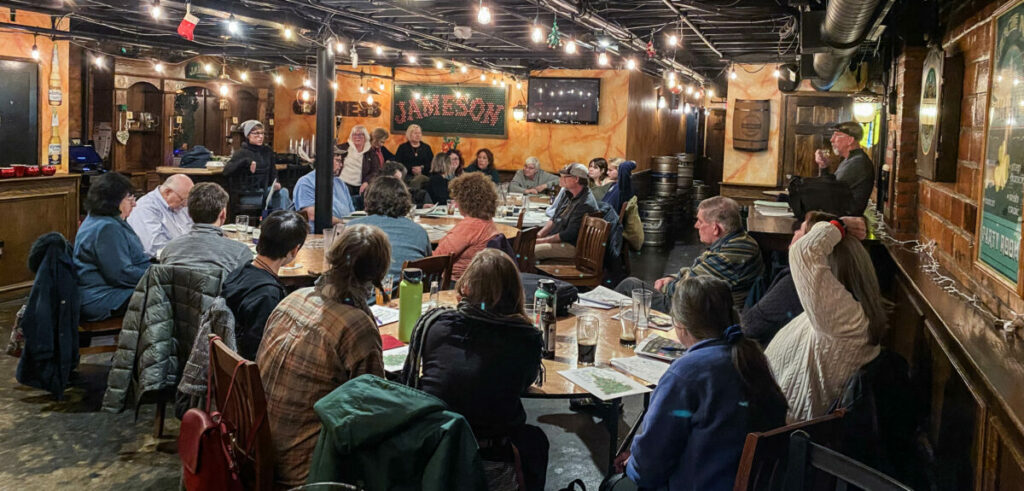
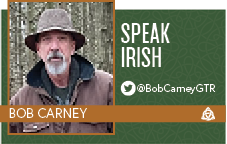
By Bob Carney
“If I had my life to live over, I’d live it over a saloon.”
A good Irish pub is much more than a place that serves alcohol or food. It can be a meeting place for the people of the community to get to know one another. Often, it’s a great place for a visitor to learn something of the people and the area itself. Some of our most memorable times in Ireland, are the interactions the crazy lady (my darling wife) and I had in small “locals” on the west coast.
The pub can also be a good place to use our “cupla focal.” Almost all Irish speakers, or gaeilgeoir, are happy to help a learner in their pursuit of the Irish language. Let’s take a trip to the pub using some of the language we’ve already covered and some new words and phrases as well.
Greetings in Irish
We’ve learned a few different ways to greet someone, from the formal Dia Duit (dee-uh gwitch) and it’s response Dia’s Muire duit (dee-us morra gwitch) God to you and God and Mary to you; to a simple haigh (hi). It is also acceptable to use the phrase, “ How are you?” as a greeting.
Try to remember to use the correct dialect depending on where you are. “Conas atá tú?” (kunass ah-taw too), in the southwest, Cén chaoi a bhfuil tú? (kay hee will too), in the Connacht region, and “Cad é mar atá tú?” (kuh jay ah mar ah-taw too), in Ulster. To reply to that question you might say, “Tá mé go maith, go raibh maith agat.” (taw may guh mah, gorra mah ah-gut), I am good, thank you.
Be polite
Good manners are as important as your passport when traveling, and only the very foolish are rude to someone serving them food or drink. Thankfully, most of us were brought up using please and thank you.
Please in Irish is “Le do thoil,” different dialects have slightly different pronunciations of this phrase, but the meaning is the same (lay duh hull) and can be used universally. “Gabh mo leithscéal” is still one of my favorite Irish phrases. It is used as excuse me, but translates to “accept my half-story.” It is pronounced (guh muh lesh-shkale).
Drinks in Irish
Leann (lawhn) is ale or beer. Black in Irish is dubh (duv), so leann dubh would be a stout or porter. Teach leanna (chawk lawna)is a tavern or ale house. Beoir (byore) is another word for beer, while pionta beorach (pyunta byor-ach), is a pint of beer.
Fíon (fee-un), is wine, fíon dearg (fee-un jer-ig) is red wine, and fíon bán (fee-un bahn) is white wine. A bottle of wine is buidéal fíona (boo-dell fee-un-ah), while a glass of wine is gloine fíona (glawn-ya fee-un-ah).
Uisce (ish-ka) is water, but uisce beatha (ish-ka bah-ha) is water of life, an appropriate term for whiskey. Often you will hear fuisce (fwish-ka) used for whiskey, not quite as poetic.
Cupán tae (kup-an tay) or a cup of tea is easier to find than a good cup of caife (ka-fay). To say you’re thirsty, “Tá tart orm.” (taw tart or-um). Remember, “Is maith an cara lagdaíonn an tart ort” (iss mah ahn kar-ah lie-deen on tart ort)” “It’s a good friend who eases your thirst.”
Food in Irish
Tá ocras orm (taw och-ras or-um), I’m hungry. They say the Eskimos have multiple words for snow, but I think we may have more words in the Irish vocabulary to describe the potato.
Práta, (praw-ta), is potato, prátaí (praw-tee) is potatoes. Prátaí rósta (praw-tee roe-sta) are roast potatoes, prátaí í luatha (praw-tee ee loo-aha) are early potatoes, but prátaí í malla (praw-tee ee mahl-ah) are late potatoes.
Prátaí í nua (praw-tee ee noo-uh) are new potatoes. A sweet potato is a práta Spáinneach (praw-ta spine-ach), lit. a Spanish potato. Práta bruite (praw-ta britt-ah) is a boiled potato. A seed potato is called práta póir (praw-ta poyhr), the r sound at the end of póir is very subtle and almost silent.
Brúitín (broocheen) is a potato dish made with scallions, traditionally served at Samhain. It is customary to leave a bowl in the bush for the fairies. A potato that has been exposed to frost is práta seaca (praw-ta shah-ka). A potato blossom is bláth bán na bprátaí (blawe bahn na braw-tee).
Cailleach (kahl-lach) is a word meaning witch or hag, or sometimes just an old woman, so a cailleach phráta (kahl-lach fraw-ta) is a shrivelled potato. I think one evening, I found a little over forty entries in the dictionary relating to potatoes. I know right now you’re thinking what an exciting life I have!
Sausages, ispíní (iss-pee-nee) are good with any type of práta, as is bagún (bah-goon) bacon. Arán donn (rawn duhn) brown bread with im (ihm) butter is also good with any meal, especially anraith (awn-rah) soup, or stobhach (stoh-vuhk) stew.
Sicín (shih-keen) is chicken, sicín rósta (shih-keen roe-sta) is roast chicken. Feoil (fee-oil) is meat, and cabáiste (kah-bawsh-ta) is the word for cabbage.
Bricféasta (brick-festah) is breakfast, a full Irish breakfast is bricféasta Gaelach iomlán (brick-faw-sta gayle-och umlawn). Lón (lahn) is lunch and suipéar (sup-air) is supper.
Phrases in Irish
Keep an eye out for new vocabulary in some of these useful phrases:
Cad ba mhaith leat? (kahd ba wah lyat?) What would you like?
Ar mhaith leat rud éigin a ól (ar wah lyat ruhd aye-gin ah ole?) Would you like something to drink?
Ar mhaith leat rud éigin a ithe (ar wah lyat ruhd aye-gin ah ih-ha?) Would you like something to eat?
Ba mhaith. (buh-wah.) I would. Níor mhaith. (neer wah.) I would not.
Ba mhaith liom (buh wah lum). I would like.
Ba mhaith liom Guinness, le do thoil. (buh wah lum guinness, lay duh hull.) I would like a Guinness please.
Ba mhaith liom pionta Guinness, le do thoil. (buh wah lum pyunta guinness lay duh hul.l) I would like a pint of Guinness please.
An ólfá deoch? (ahn ol-fa jawhk?) Will you have a drink?
Is maith liom Guinness (iss mah lum Guinness.) I like Guinness.
An mhaith leat Guinness? (ahn wah lyat Guinness?) Do you like Guinness?
Ar mhaith leat ithe? (ar wah lyat ih-ha?) Would you like to eat?
Cén áit ar mhaith leat a ithe? (kayn aht ar wah lyat ah ih-ha?) Where would you like to eat?
Cathain ar mhaith leat a ithe? (kah-hinn ar wah lyat a ih-ha?) When would you like to eat?
Anois (ah-nesh) now. Ní anois (nee ah-nesh) not now
Níos déanaí. (neesh dee-uh-nee.) Later.
In the month of May, Mary and I celebrate our wedding anniversary. This year marks forty-seven years ( I’m amazed she puts up with me!). Anyway, we started this column with a quote about “if I had my life to live over again,” and I’d like to share this one with Mary.
“Dá mbeadh mo shaol á dhéanamh agam arís Gheoghainn tusa luath ionas gurbh fhéidir liom grá thabhairt duit níos faide.” “If I had my life to live over again, I’d find you sooner, so I could love you longer”
Slán go fóill

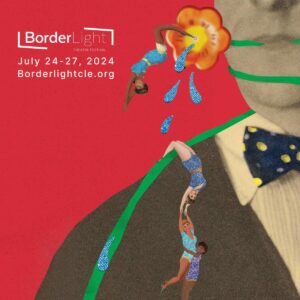
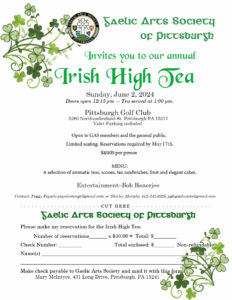

See this and all of Bob’s columns HERE

*Bob Carney is a student of Irish language and history and teaches the Speak Irish Cleveland class held every Tuesday at PJ McIntyre’s. He is also active in the Irish Wolfhound and Irish dogs organizations in and around Cleveland. Wife Mary, hounds Rían, Aisling and Draoi and terrier Doolin keep the house jumping. He can be reached at [email protected]
ends
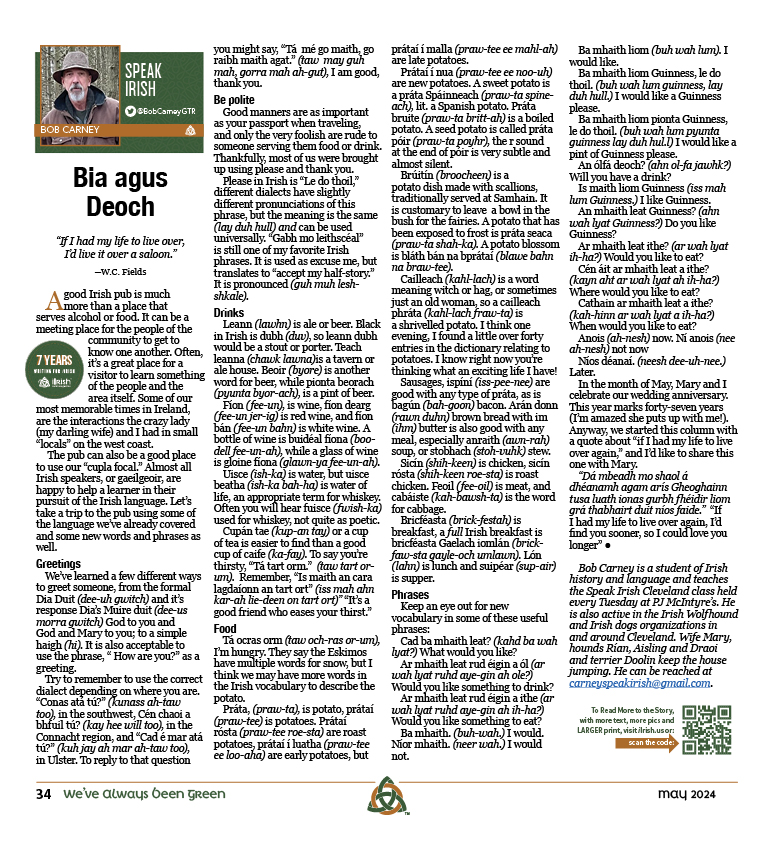

Monthly newsmagazine serving people of Irish descent from Cleveland to Clearwater. We cover the movers, shakers & music makers each and every month.
Since our 2006 inception, iIrish has donated more than $376,000 to local and national charities.
GET UPDATES ON THE SERIOUS & THE SHENANIGANS!